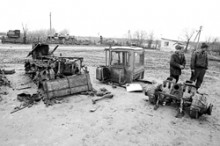On April 5, residents of Tarasivka were to get their land certificates. But the previous day the office of the former Tarasivka collective farm (kolhosp) still had bust of Lenin decorated with a loud wreath, although there is no traditional plate bearing the farm’s name. And the farmers are quick to explain to us that the farm is undergoing reform. We encountered the hallmarks of this reform right in the office, as we see two pensioners diligently filling in their certificate forms.
We also dropped in on the farm chairman, Vitaly Mykhailovych Bilokrys, one of the few agrarian leaders who has managed to keep his farm afloat. The farm in Tarasivka has no debts to the state or commercial entities. According to the manager, wages are paid on time and there is a sufficient supply of diesel fuel to last through the spring sowing. There is a lack of fertilizers but “as soon as we pay for them we shall get them,” Mr. Bilokrys assured.
Several years ago the farm was still abiding by the milk and vegetable production profile which it had been assigned from above in the Soviet Union. Shrinking livestock breeding, not kolhosp managers, contributed to the decline of farming in Ukraine, Mr. Bilokrys maintains. He says that the livestock was bled by the administrative support for the farms which are losing money due to low meat prices. The decline in animal husbandry was followed by a slump in the vegetable sector.
Orchards came to the rescue, following the planting of saplings from the Netherlands in 1995. Business picked up, and the farm has both apples awaiting spring sales in refrigerators and young plants selling at $2 apiece and bearing fruit even in the first year. Fruit trees become the No. 1 earner for Tarasivka residents. However, had it not been for last year’s tax breaks, the farm “would have gone bankrupt, like many others,” Mr. Bilokrys says.
An avid supporter of orchards and Dutch varieties of apple-trees, Vitaly Bilokrys fall silent when the conversation turns to economic reforms. First, he blames the sharp decrease in sapling sales on the reforms, since “very few think of the future.” Secondly, the reform should have been started seven years ago when the farm had both the equipment and the money. To move the farm into the black, money is needed, regardless of whoever heads the farm now, he believes. And the money is nowhere to be found. Thirdly, the reform is aimed at allowing the farmers to make some noise, let off steam, and then back together in collective farms. He no longer supports the whole idea and is against setting up a cooperative. Instead, a limited liability company is to be created in Tarasivka, with Mr. Bilokrys and the former kolhosp’s main specialists being the founders, “those who can decide things and not just wait to get paid.”
The problem of dividing things up, especially the distribution of property, is very complex, Bilokrys warns. He thus sounds sincere when he declares that the more farmers leave the kolhosp, the better. In this case, their total share might be enough to let them have a greenhouse or some machinery. And what about those deciding to go it alone?
From the office we first went to the diary. Although it was still an hour and a half before the second milking, we met two milkmaids who gave just their first names, Liubov and Valentyna. They start their day at 4 a.m., earning a mere 80 to 150 hryvnias a month. Both women said they are going to transfer their family shares to the farm manager, for they have no other options. The more so, because they are dependent on the farm manager since they live in the former farm hotel.
We heard quite a different story about the reform from the tractor brigade. The only thing the boisterous tractor drivers and soft-spoken milkmaids was their unwillingness to give their names. As we understood it, the farm manager has them in his pocket. “He pays us 80 hryvnias for the same work for which he pays 300 hryvnias to workers he hires from other villages,” the tractor drivers with oily hands complained. “He paid us with a mere 80 kg of grain for trimming trees while the outsiders got three and a half tons.”
The small group of farmers around us would shrink away as soon as they saw an approaching farm official. The issue that kept the farmers agitated was their property shares. Everyone said they would prefer to leave the kolhosp but their chances of getting any tangible property or equipment which would help them to start on their own were zero.
The tractor drivers also told us about the way the voting had been held at the last meeting of shareholders, with the manager bragging, “Whether you vote for me or not, I will remain manager anyway.” The manager promised a tractor only to a group of ten farmers taking out their share. And what about fuel and other machinery? Asked about their future plans once out of the kolhosp, the farmers replied that although their prospects are unclear they wanted to leave. They can always earn the meager 80 hryvnias in kolhosp wages when they become independent farmers, and they will be spared humiliation.
It became clear to us why the farmers reaction to our very first question about their opinion of the reforms in farming, “Things will get even worse.”







